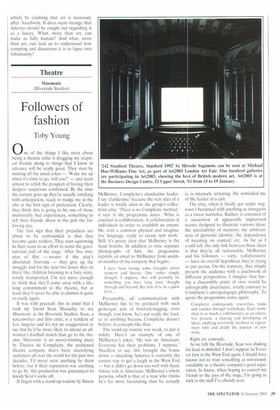Theatre
Mnemonic (Riverside Studios)
Followers of fashion
Toby Young
One of the things I like most about being a theatre critic is dragging my sceptical friends along to things that I know in advance will be really good. They start by making all the usual jokes — 'Wake me up when it's time to go, will you?' — and seem almost to relish the prospect of having their deepest suspicions confirmed. By the time the curtain goes up they're usually smirking with anticipation, ready to nudge me in the ribs at the first sign of pretension. Clearly, they think this is going to be one of those memorably had experiences, something to tell their friends about in the pub the following day.
The first sign that their prejudices are about to be confounded is that they become quite restless. They start squirming in their seats in an effort to resist the gravitational pull of the stage. After five minutes of this — sooner if the play's absolutely first-rate — they give up the struggle and for the next two hours they sit there like children listening to a fairy story, totally transported. I'm not naive enough to think that they'll come away with a lifelong commitment to the theatre, but at least they'll never be able to dismiss it quite so easily again.
It was with precisely this in mind that I took my friend Sean Macaulay to see Mnemonic at the Riverside Studios. Sean, a screenwriter and film critic, is a resident of Los Angeles and it's not an exaggeration to say that he'd be more likely to attend an allwomen's football match than go to the theatre. Mnemonic is an award-winning piece by Theatre de Complicite, the acclaimed theatre company that's been electrifying audiences all over the world for the past two decades. I'd never seen anything by them before, but if their reputation was anything to go by, this production was guaranteed to knock Sean's socks off.
It began with a stand-up routine by Simon McBurney, Complicite's clandestine leader. I say 'clandestine' because the very idea of a leader is totally alien to the group's collectivist ethic. 'There is no Complicite method,' it says in the programme notes. 'What is essential is collaboration. A collaboration of individuals in order to establish an ensemble, with a common physical and imaginative language, ready to create new work.' Still, it's pretty clear that McBurney is the head honcho. In addition to nine separate photographs of him, the programme reprints an email to McBurney from another member of the company that begins:
I have been having some thoughts about memory and history. One rather simple thought. I suppose, that will probably be something you have long since thought through and beyond. But here it is, in a quick
Presumably, all communication with McBurney has to he prefaced with such grotesque acts of forelock-tugging, even though, you know, he's not really the leader or anything because Complicite doesn't believe in concepts like that.
The stand-up routine was weak, to put it mildly. Here's an example of one of McBurney's jokes: He was an American. Everyone has their problems, I suppose.' Needless to say, this brought the house down — attacking America is currently the easiest way to get a laugh in the West End — but it didn't go down too well with Sean, whose wife is American. McBurney's whole persona, which is that of a man who thinks he's far more fascinating than he actually
is, is intensely irritating. He reminded me of the leader of a cult.
The play, when it finally got under way, wasn't burdened with anything as bourgeois as a linear narrative. Rather, it consisted of a succession of apparently improvised scenes designed to illustrate various ideas: the unreliability of memory; the arbitrariness of personal identity; the dependence of meaning on context; etc. As far as I could tell, the only link between these ideas is that they're all fashionable. McBurney and his followers — sorry. 'collaborators' — have no overall hypothesis they're trying to put across. On the contrary, they simply present the audience with a patchwork of different perspectives. I imagine that having a discernible point of view would be unforgivably doctrinaire, totally contrary to Complicite's anti-pedagogic philosophy. To quote the programme notes again:
Complicite continuously researches, trains and teaches through workshops. Each workshop is as much a collaborative as an educative process, a sharing and developing of ideas, enabling everybody involved to experiment with and clarify the journey of new work.
Right on, comrade.
As we left the Riverside, Sean was shaking his head in disbelief. I don't suppose he'll ever set foot in the West End again. I should have known not to trust something as notoriously unreliable as a theatre company's good reputation. In future, when hoping to convert my friends to the joys of the stage, I'm going to stick to the stuff I've already seen.


























































 Previous page
Previous page